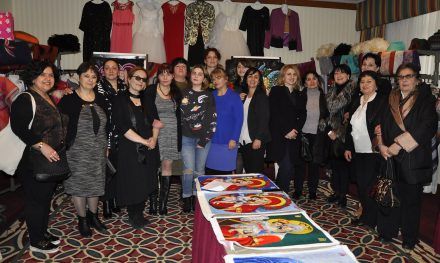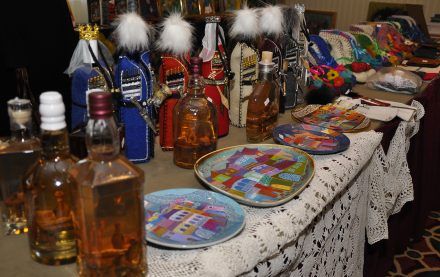Strengthening support services in Georgia for female survivors of violence, discrimination and stigma
12th April 2018

Stigma and discrimination towards those who have been in prison is still prevalent in Georgia, and unemployment is high – making it difficult for women to find jobs. PRI is working on a project that aims to strengthen access to services for female prisoners, former prisoners and probationers who are survivors of violence, discrimination and/or stigma. Our Monitoring, Evaluation and Learning Officer Jane Rice, who recently carried out a mid-term evaluation of the project, explains how it is making strides to improving women’s well-being, empowerment and livelihoods.
Last month I travelled to Georgia to evaluate the project, which has been running since December 2016. The project is funded by the EU and is being implemented in partnership with four national NGOs (Article 42 of the Constitution, the Georgian Professional Psychologists’ Association, Georgian Association Women in Business, and Tanaziari), as well as state institutions including the Ministry of Corrections and the National Probation Agency. The services, provided by the partner NGOs, include legal aid, psychological counselling, medical services, vocational training, start-up grants for small businesses and work opportunities. There is also a shelter for homeless former prisoners and probationers and their children, and the project has funded the salary of a childcare assistant to work in the mother and baby unit at the women’s prison, and a dedicated nursery for these infants will soon be built. The project is in line with Bangkok Rules guidance on ensuring gender-sensitive rehabilitation programmes for women prisoners, to aid their reintegration back into society.
This evaluation was carried out as part of PRI’s commitment to learning and accountability and to delivering the best projects and services to the people we serve. Project stakeholders were also very keen to have the project assessed, as the concept is a new and innovative one and there is a great deal of interest in its results. Although PRI has supported services for women in the criminal justice system before, this project is the first of its kind supporting vulnerable women specifically and the first where there has been involvement from a range of government and non-government institutions to provide complementary services. The mid-term evaluation was conducted by myself and the Georgian Association of Social Workers to assess progress so far, specifically the quality of the services provided and their impact, and to make recommendations for the remainder of the project.
 During my stay in Georgia, I visited the women’s prison, a shelter for homeless women, and a start-up incubator and training centre that is funded by the project. Women’s Prison No. 5 is located just outside the town of Rustavi, a 45-minute drive from the capital Tbilisi. The prison is the only women’s prison in Georgia and houses nearly all of the country’s women prisoners (some pre-trial detainees are housed in other facilities). The prison comprises a series of cell blocks and training facilities as well as an administrative building, all within tarmacked grounds where women hang up washing or use the public telephones. Each cell block has its own training room, where women can participate in courses such as traditional Georgian felt making, beauty therapy and hairdressing. There is also a sewing enterprise run by Women in Business, where around 50 women are employed under a contract with the Ministry of Corrections to make mattresses for men’s prisons. The women can earn a wage, which they can either send to their families outside or spend on themselves in prison.
During my stay in Georgia, I visited the women’s prison, a shelter for homeless women, and a start-up incubator and training centre that is funded by the project. Women’s Prison No. 5 is located just outside the town of Rustavi, a 45-minute drive from the capital Tbilisi. The prison is the only women’s prison in Georgia and houses nearly all of the country’s women prisoners (some pre-trial detainees are housed in other facilities). The prison comprises a series of cell blocks and training facilities as well as an administrative building, all within tarmacked grounds where women hang up washing or use the public telephones. Each cell block has its own training room, where women can participate in courses such as traditional Georgian felt making, beauty therapy and hairdressing. There is also a sewing enterprise run by Women in Business, where around 50 women are employed under a contract with the Ministry of Corrections to make mattresses for men’s prisons. The women can earn a wage, which they can either send to their families outside or spend on themselves in prison.
The women I met both in and outside the prison had been able to make huge strides towards their own rehabilitation and reintegration due to the services provided.
I also visited the shelter for homeless women, which opened in 2015 and which is the only one of its kind in Georgia. It currently houses 10 women, although there is space for 12. The shelter was cosy and welcoming with bedrooms for residents, a living room and kitchen, and a room for another sewing enterprise, where women were making mattresses for the same contract as in the prison. The last visit was to the business start-up incubator and training centre run by the Georgian Association Women in Business, where former prisoners and probationers were taking part in a culinary skills course.
All the women prisoners, former prisoners and probationers I met during my visit were motivated, enthusiastic and making the most of the services offered to improve their lives. Women I met both in and outside the prison had been able to make huge strides towards their own rehabilitation and reintegration due to the services provided. Although many of the women had complex needs, the added value of the project is that it aims to meet all of these through the provision of services by specialised NGOs. If a woman had first accessed legal aid, and it appeared that she also had a need for psychological counselling, she could also be referred to this service if she wanted.
Through the project, one woman had been able to obtain ID documents for her and her daughter, thanks to legal aid, and another had relearned how to cook for herself and her family through a culinary skills course. Others had learned how to sew and were earning a wage through the sewing workshop, and some were making and selling beautiful felt art and clothing. Although these may sound like minor achievements, for these women having these basic needs met and being able to earn a wage were a huge deal and it meant they could move on with lives and make further changes. The ultimate goal for nearly all the women was to find stable employment. Unfortunately, stigma and discrimination towards those who have been in prison is still very prevalent in Georgia and unemployment is high, making it difficult for women to find jobs. It is too early to tell what long-term impact this project will have, but so far it is making strides to improving women’s well-being, empowerment and livelihoods.
Main image: PRI and partner staff at an exhibition showcasing handicrafts made by women prisoners.
More information
PRI raises awareness about discrimination faced by women in criminal justice systems and promotes the implementation of standards taking into account the specific characteristics and needs of female offenders and women prisoners. We organise training to raise awareness of the Bangkok Rules, and we have conducted research in seven countries on the backgrounds and characteristics of women offenders, in order to inform evidence-based policy. Read our research report, Who are women prisoners? Survey results from Armenia and Georgia.